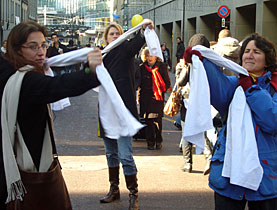
Women unite against gender violence

A fist in the face, a kick in the pregnant stomach, sexual comments at work, verbal threats - violence is a daily reality for hundreds of women in Switzerland.
Campaigners marking International Day for the Elimination of Violence against Women gathered in Bern on Tuesday to highlight the message of women in danger.
With 25 women killed by their partners every year in Switzerland, domestic violence is the leading cause of damage to health and death for younger women, ahead of cancer and road accidents.
The deaths are the ultimate and extreme demonstration of a problem that reaches deep into society, said Andrea Wechlin, a women’s refuge counsellor. She told swissinfo that her experience confirmed that the home is all too often a violent place for women.
“The problem is widespread, affecting up to one in four Swiss households. This is also backed up by police figures.
“But we assume that the real numbers are higher because not all women go as far as reporting incidents to the police or going to a refuge,” Wechlin added.
Isolating effect
The physical and psychological effects on victims of domestic violence can be extreme. Health consequences range from physical injury to long-term psychological effects.
“There is also the isolating effect of the violence. Many women don’t dare to inform friends, family and community about what’s happening in their home and they withdraw more and more. They may also be prevented by their violent partner from keeping up contact with people or pursuing work outside the home.”
Previous campaigns have played an important role in drawing attention to the problem of violence against women.
“You can now say that you are the victim of domestic violence and be taken seriously, which wasn’t necessarily the case 20 years ago,” Wechlin said.
“I hope this campaign will make the subject even more widely spoken about in Switzerland and that people will be made more aware of domestic violence in this country and the fact that children and men can also be affected.”
Sixteen days
This year Switzerland is participating for the first time in a 16-day international campaign to highlight gender-based violence. A Swiss feminist peace organisation, called cfd, is active in the empowerment of women in conflict and is the main force behind events in Switzerland.
“This campaign is a platform through which all the organisations, institutions and groups that have been working separately against violence can bring forward their demands within a fixed time frame,” Amanda Weibel of cfd told swissinfo.
Activities include conferences and debates, film screenings and even a disco against homophobic lyrics. The campaign kicked off with an eye-catching display in the old town of Bern. A group of participants following cues broadcast on local radio performed a “radio-ballet” pantomime in the streets.
Apart from drawing attention to direct violence, cfd is also concerned about the impact of structural violence.
“With structural violence you cannot identify one perpetrator, rather it is structures within society that enforce inequality and allow women to suffer in the long term. One important example is the unequal salaries for women in the workplace,” Weibel said.
Between one in four and one in five women in Switzerland has experienced physical or sexual violence at the hands of a partner at some point, according to a 2004 study.
The research showed that women who suffered domestic violence also suffered dramatic health consequences, ranging from chronic pain and panic attacks to suicidal feelings.
More than 40 Swiss organisations are taking part in this year’s 16-day campaign, including victim support centres, women’s refuges, men’s, women’s and peace organisations and unions.
November 25 is the first day of a 16-day campaign of activism against gender violence, taking place in more than 130 countries. The campaign runs until International Human Rights Day on December 10, making the link between gender violence and human rights.
International Day for the Elimination of Violence against Women on November 25 was first initiated to commemorate the murder of three sisters Patria, Minerva and Maria Mirabel in the Dominican Republic in 1960.
The Mirabel sisters, who were active in the underground resistance against dictator Rafael Leonidas Trujillo, were brutally murdered after being released from prison. Their courage has been taken to symbolise the worldwide struggle of women against injustice.

In compliance with the JTI standards
More: SWI swissinfo.ch certified by the Journalism Trust Initiative






























You can find an overview of ongoing debates with our journalists here . Please join us!
If you want to start a conversation about a topic raised in this article or want to report factual errors, email us at english@swissinfo.ch.